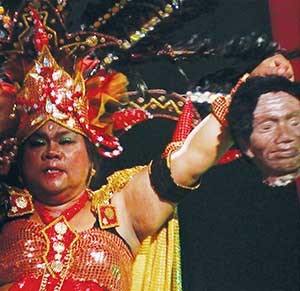

The death by garrote of Luca Brasi, acted out by the corpulent Lenny Montana in The Godfather, isn’t something you forget fast. The thought that someone made a way of life out of this kind of killing, that he killed a thousand men in this way—is the most stomach-churning part of the documentary The Act of Killing by Joshua Oppenheimer.
Oppenheimer interviewed several of the now-elderly heads of paramilitary groups in North Sumatra, Indonesia. In the 1960s, these men participated in the killing of some 2.5 million Chinese nationals and Communists. Suharto’s military government encouraged this bloodbath. So did the U.S. government, which was conducting the Vietnam war 1,100 miles away. So did the editorial page of the New York Times.
In their country, the old men are considered heroes. The Act of Killing shows us the vice president of Indonesia visiting the Pancasila, a paramilitary army dressed in tiger-pattern camouflage uniforms. The politician encourages their “great work” in Tea Party terms, contrasting private initiative versus government effort.
Anwar Congo, a killer who is now a slender old man in a double-breasted tropical-weight suit, talks about the kind of life he once lived as a moviegoer and a carouser. He dances a bit, recalling his youth, and you think of Alex the Droog kicking someone’s teeth out to “Singin’ in the Rain,” or Michael Madsen shuffling over to torture a cop in Reservoir Dogs.
Oppenheimer encourages Congo and a few of his comrades to restage the killings. First, it’s an ordinary re-enactment. Then, when Congo critiques what he sees on video as fake, the team reaches for higher production values, with lighting, costuming, prosthetics and location shooting. Stars arrive from elsewhere: Congo’s old pal and fellow executioner, the dapper Adi Zukadry, who is the one person in the film who seems to foresee the self-examination and pain that’ll result from this cinematic experiment.
Some of what must have led Alamo Drafthouse to pick up this documentary is the psychotronic aspect: the startlingly corrupt Herman Koto, an obese would-be parliamentarian, thinks he’s in a Jodorowsky movie. He playfully pretends to eat a pal’s liver. (“Look what I found in your stomach! Ugh! It’s rotten!”) In Divine-like pink drag, Koto directs a line of depressed chorus girls as they emerge from the maw of a giant metal carp.
These bizarre images distract from the confessional restaging of atrocities. They also distract from the question at the center of The Act of Killing: whether it was film-watching itself that carried the seed of all this cruelty. Like the repulsive Ariel Castro, the elders here use a monkey-see, monkey-do defense. The Communists they killed led a boycott against American films, which interfered with the living Congo and his comrades made as movie ticket scalpers.
What Oppenheimer wants to capture is the old men mourning at midnight what they did in the midday of their youth. This remorse almost eludes him. It’s outside of the narrative Congo and company have in mind. A member of the crew on a shoot tells the story of the gangster murder of his stepfather, smiling as he tells it, to avoid dangerous impoliteness to a still well-connected hit man (“I promise I’m not criticizing you”).
Congo considers the squalid story, the dumped body buried by the roadside “like a dead goat.” He judges it all wrong for a movie: “Your story is too complicated.”
Oppenheimer lets a lot of questions hang in the air, but one of them is what Congo’s grandkids think of the old man getting beaten up in a film, when he reverses places and is cast as a victim instead of a torturer. The kids walk off, and we don’t know if they’re grossed out, embarrassed or bored by the amateurishness. This vision of the past doesn’t engage them—why should it? There have been movies about the impossibility of recapturing a holocaust on film—Atom Egoyan’s Ararat is one—but even as prosecutorial a director as Oppenheimer can’t answer the question of why, after a century of cinema, the world’s sense of empathy isn’t getting any stronger.
The Act of Killing
115 MIN


